democracynow.org
Stories:

"Groundbreaking" Exposé Shows Pentagon Thwarting Obama's Bid to Transfer Guantánamo Prisoners
In the nearly seven years since President Obama ordered Guantánamo’s closure, Republicans have blocked him at every turn. Now a new report sheds light on another obstacle in Obama’s way: his own Pentagon. According to Reuters, military brass have imposed bureaucratic hurdles to keep prisoners locked up and prevent foreign governments from taking them in. Scores of prisoners cleared for release have remained imprisoned for years as a result. We are joined by two guests: Charles Levinson, the Reuters reporter who broke this story, and Omar Farah, the lawyer for a Yemeni prisoner who was cleared for release five years ago but remains behind bars due to Pentagon interference.
TRANSCRIPT
This is a rush transcript. Copy may not be in its final form.
JUAN GONZÁLEZ: Next month will mark seven years since President Obama’s inauguration. That also means it will be seven years since the president ordered the closure of the Guantánamo Bay military prison in one of his first executive actions. We all know that has not panned out, with 107 prisoners still there. It’s also well known that congressional Republicans are the biggest obstacle, passing a series of measures blocking Obama’s effort.
But now a new report sheds light on another hurdle that’s received far less attention. According to Reuters, the Pentagon has thwarted the Obama administration’s efforts to close Guantánamo by imposing bureaucratic hurdles to delay or derail prisoners’ release. A former official compared negotiating prisoner releases with the military brass to "punching a pillow." Pentagon delays forced four Afghans to spend an additional four years in Guantánamo despite their approval for transfer. The Pentagon has even meddled with the effort to enlist other countries in accepting freed prisoners. It’s refused to provide foreign governments with photographs and basic documentation necessary for the transfer process. And it’s barred foreign delegations from spending the night at Guantánamo and reduced their interview times with eligible prisoners, making the prisoners much harder to vet.
AMY GOODMAN: In one case, the Pentagon refused to release medical records for a hunger-striking Yemeni prisoner to a delegation from a country that was considering taking him. The prisoner, Tariq Ba Odah, remains at Guantánamo today—five years after he was cleared for release.
The obstruction appears reserved for President Obama. While President Bush transferred 532 prisoners out of Guantánamo and faced no political opposition, Obama has only been able to transfer 131 during his two terms. Obama has said he’ll push Congress on closure during his final year in the White House. But Reuters notes, with the added obstacles from the Pentagon, it’s increasingly doubtful that Obama will be able to fulfill his pledge.
For more, we’re joined by two guests. Charles Levinson is a Reuters correspondent who co-wrote this special report on Pentagon obstruction. And Omar Farah is with us, an attorney with the Center for Constitutional Rights. He represents Tariq Ba Odah, the Yemeni prisoner who remains locked up at Guantánamo because of the Pentagon’s interference.
We’re going to go first to Charles Levinson in Reno, Nevada. Can you talk about the scope of what you discovered? I mean, this is President Obama’s Pentagon.
CHARLES LEVINSON: Right, yeah. Basically, there is a sort of a deep institutional resistance in the military, in the Pentagon, against closing Guantánamo among a lot of rank-and-file, mid-level and more senior officers. And they’ve been able to use their sort of bureaucratic and administrative control over the Guantánamo Bay detention center to make it difficult to accomplish a lot of the things that need to be done in order to close the prison, such as facilitating visits of foreign delegations from countries who the United States, the Obama administration, is asking to take prisoners that they want to transfer out of the prison.
JUAN GONZÁLEZ: Well, what about some of those—
CHARLES LEVINSON: In the example of Tariq Ba Odah, for example, a third country that the U.S. had asked to take Ba Odah wanted to see the prisoner’s full medical file. This is a prisoner who’s been on hunger strike for seven years. His weight has dropped from 148 pounds to, I think, 60-something. He obviously needs—is going to need a lot of acute medical care by any country that takes him in, and they wanted to review his full medical file. And the Pentagon said—wouldn’t turn it over and still has not turned over that full medical file, instead just handing in a brief summary. The official reason the Pentagon has given for this is patient privacy concerns. But Mr. Ba Odah’s lawyer has waived those concerns. And I think a lot inside the administration believe that such concerns are really just a pretext for making it difficult to transfer Ba Odah, who I think many inside the military view as sort of still in the fight, since he has been on this hunger strike for seven years.
JUAN GONZÁLEZ: But, Charles Levinson, on these other limitations, for instance, this issue of not allowing foreign delegations to sleep over in Guantánamo, when everyone knows what a remote place, how difficult it is to get to Guantánamo, what about this limitation? Why do they—how do they explain that?
CHARLES LEVINSON: Right, this one is one that has particularly rankled certain U.S. officials who are trying to work to close the prison. Basically, these foreign delegations come to Guantánamo Bay, and they want to interview as many prisoners as they’re considering taking. It can be five, six, seven, eight prisoners, and they want to spend time getting to know these guys. Do we trust them? Do we believe that, you know, they really won’t be a threat to us if we bring them to our country? And they need to get to know these prisoners, and they’re encouraged to do so by the Obama administration. And that can take time. And so, if you—so, instead of coming down and spending a couple days, two, three days, interviewing these prisoners, recently—basically, since Obama began his new push to close this prison—the military has put new restrictions on spending the night at Guantánamo. And these are new. I mean, for a long time, foreign delegations were visiting this detention center and were allowed to spend the night. But more recently, they have been prevented from doing so.
And that has an impact not just on the ability of the Obama administration to facilitate these prisoner transfers and close the prison, but it also has a cost on taxpayers, because, at least in one case, the delegation in question had to commute each morning and afternoon from Miami—it’s a 90-minute flight, it’s taxpayer-funded—and that added tens of thousands of dollars in costs in airfare of military planes to facilitate this sort of very burdensome commute schedule.
AMY GOODMAN: Charles Levinson, in your article, you cite Pentagon spokesman Gary Ross, a U.S. Navy commander. He says, quote, "No foreign government or U.S. department has ever notified the Department of Defense that transfer negotiations collapsed due to a lack of information or access provided by the Department of Defense." Can you respond to this?
CHARLES LEVINSON: Right. I mean, it’s not a surprise to see the Pentagon—and the White House, for that matter—at least publicly, putting on a public face of unity and cohesion and not sort of highlighting in their public statements the discord. But that statement certainly did not jive with our own reporting and many, many officials, current and present, that we spoke to, who voiced deep frustrations with the Pentagon and relayed to us that they had indeed conveyed those frustrations to military officials many, many, many times over the past several years.
JUAN GONZÁLEZ: And were you able to get, in your reporting, any sort of indication from the White House of its frustration with this policy? And why doesn’t the president just, as commander-in-chief, order that this stuff be done?
CHARLES LEVINSON: Right, and I think there has been a movement towards doing that. I know, to—I think, to us outsiders, who aren’t in the White House and in government, it seems as easy as a president just saying, "If this is what I want, this is the way it should be." And the fact that it’s not that easy sometimes surprises us. I think, you know, part of the reason that former Defense Secretary Hagel was removed from office—I mean, there are several factors, but certainly one of them, according to many people, including Hagel himself—was the president’s frustration over the Pentagon’s slow progress transferring prisoners.
And more recently, Hagel’s successor, Ash Carter, was summoned to the White House just before Labor Day and was—you know, for a one-on-one sitdown with Obama, who, according to—people briefed on the meeting told us that Obama gave him sort of a very candid talk about the need to step up progress on this front. And I think, since that talk, there has been some progress. And there is a sense that things have gotten somewhat better, although there are still many frustrations. It is expected, for example, that next month, in January, there will be 17 prisoners transferred out. So, it does appear that as a Obama has sort of refocused and double down his attentions on this and really given this more attention, there has been some—you know, he has been able to make some headway in getting the Pentagon to do his bidding.
AMY GOODMAN: Maybe we can find out exactly what President Obama said to the secretary of defense when someone hacks into his private email account, right? It was just admitted that he was using that on his iPhone to talk with his staff.
... Read More →
Cleared for Release, Pentagon Obstruction Prolongs Hunger-Striking Gitmo Prisoner's Nightmare
A new Reuters exposé shows the Pentagon has thwarted the Obama administration’s efforts to close Guantánamo by imposing bureaucratic hurdles to delay or derail prisoners’ release. The Pentagon has even meddled with the effort to enlist other countries in accepting freed prisoners. In one case, the Pentagon refused to release medical records for a hunger-striking Yemeni prisoner to a delegation from a country that was considering taking him in. The prisoner, Tariq Ba Odah, remains at Guantánamo today—five years after he was cleared for release. We discuss Ba Odah’s ordeal with his lawyer, Omar Farah, an attorney with the Center for Constitutional Rights; and Charles Levinson, the Reuters reporter who broke the story.
TRANSCRIPT
This is a rush transcript. Copy may not be in its final form.
AMY GOODMAN: But, Omar Farah, you are the attorney for Tariq Ba Odah, who remains at Guantánamo, though he was cleared five years ago. Tell us his story and why this is so significant, what Reuters has found.
OMAR FARAH: The reports from Reuters are groundbreaking reporting on Guantánamo, and the revelations about just the extent of dysfunction and insubordination in the White House around what the president says is a signature policy objective are just damning. And I think the—at the extreme, really, is the case of Mr. Ba Odah. I visited Mr. Ba Odah in March and April of this year and found him in utterly disastrous physical condition. According to the government, not me, Mr. Ba Odah is just 74-and-a-half pounds, and that’s 56 percent of his safe body weight. And we moved, at the Center for Constitutional Rights, moved on an emergency basis to have him released, because the laws of war, the Authorization for the Use of Military Force, these laws do not contemplate the indefinite detention of a cleared prisoner who is at that level of precarious physical degradation. And what it turns out now, from Reuters, is that none of this has been necessary, because there’s already a foreign country ready to accept Mr. Ba Odah and provide him medical care.
AMY GOODMAN: That the country is?
OMAR FARAH: I’m not—I’m not aware. I’m not permitted to discuss even if I were aware. The fact of the matter is what—the last step, it appears, one of the last steps in the negotiated release of this desperately ill prisoner is the simple ministerial task of forwarding his medical records to that foreign delegation. And the Department of Defense, according to Reuters’ reporting, has simply refused, despite multiple interventions from the National Security Council. And it’s no hyperbole to say that this man’s life and liberty is in the balance. And instead of emailing or simply faxing the records to a foreign delegation, the government has simply refused to do that. And this, no matter how the story of Guantánamo ends, is a black mark on the Pentagon and the White House. The Center for Constitutional Rights has long criticized the president for failing to bring the full weight and authority of his office behind this objective, and I think this is the most damning example of that level of inspiration.
JUAN GONZÁLEZ: But tell us exactly how did your client end up in Guantánamo, where was he—where was he captured, and then about the process of his being cleared for release.
OMAR FARAH: The vast majority—like the vast majority of prisoners at Guantánamo, Mr. Ba Odah was arrested in Pakistan. I think there’s a stubborn and really unfortunate myth about the men detained at Guantánamo that all of them at some point were squared off with U.S. forces and were sent to Guantánamo to neutralize the threat they’ve posed. The government’s documents themselves demonstrated that’s patently false. And Mr. Ba Odah was arrested in Pakistan, and he says, to this day, he does not understand the reasons why he was sent there. But—
JUAN GONZÁLEZ: So he was arrested by Pakistani—presumably Pakistani law enforcement, in some way.
OMAR FARAH: That’s exactly what—
JUAN GONZÁLEZ: And must have been handed over to the U.S. at some point then.
OMAR FARAH: Again, common practice, in light of the government’s really slipshod and hopelessly imprecise bounty-based system of rounding up people and sending them to Guantánamo. As you know, Mr. Ba Odah has been cleared for release. And just so your viewers understand what that means, that means by the unanimous determination of the most important national security and defense organizations—agencies within the U.S. government, they have determined that he can leave Guantánamo.
And now, the missing piece of that puzzle seems to have been resolved, which is that there is a foreign country, a third country, ready to accept him and help provide him medical care and rehabilitate him. This is a person who’s desperately, desperately ill. And the last step of that negotiated release, it seems, is the simple task of forwarding his medical records. The Department of Defense cites privacy concerns as the reason why they haven’t done that. That’s a lie. And it’s a bad lie. And I know that because I sat with Mr. Ba Odah while he provided his informed written consent to release of his medical records, to me as his counsel and also for the specific purpose of negotiating his release. And can anyone doubt whether or not this man, at 74 pounds, force-fed through the nose twice a day, in solitary confinement, would provide his consent, knowing that it could lead to his release from Guantánamo after 14 years?
AMY GOODMAN: You work at the Center for Constitutional Rights. Does CCR have any legal recourse here?
OMAR FARAH: We already have a motion that is ripe and pending before a federal judge in D.C., asking for his release on the basis of his grave medical condition. And, of course, the implication of the Reuters reporting is that, really, the administration itself is in this schizophrenic state of stating that they want to release Mr. Ba Odah—that’s something that’s in the government’s briefs filed in federal court—and at the same time working, it seems tooth and nail, to prevent that from happening. And so we’ll have to consider what to do next.
AMY GOODMAN: Finally, Charles Levinson, what is the rationale that people inside the Pentagon give? And if Hagel was forced out over this, the former secretary of defense, will the same thing happen to Ash Carter? And what about President Obama’s use of executive orders?
CHARLES LEVINSON: He reserves the right to resort to executive order to deal with closing the prison, and I think that’s largely a part—you know, that will largely come to the actual act of transferring the remaining 40, 50 prisoners in Guantánamo, who are deemed too dangerous to transfer, back to the United States.
As for Ash Carter’s future, I don’t want to predict. I think it’s going to—you know, it will largely depend on how things play out in the next weeks and months, as whether—as to whether there is substantial progress. And it is seen that the Pentagon has sort of stepped up its cooperation with the administration on this effort to close Guantánamo.
The first part of your question about the justifications inside the Pentagon, inside the military, well, I think one of the big factors is simply that if you look at the wars the U.S. has fought over the past decade and a half, particularly the war in Afghanistan, which is the one that relates to Guantánamo, it’s the military that’s paid the highest price in those wars. You know, the vast majority of U.S. casualties have been U.S. soldiers and military personnel. And I think there’s a deep reluctance to release any prisoner who may have—who the military believes or fears may have been involved in the fight against U.S. personnel, military personnel in Afghanistan, or fears perhaps could return to fight against U.S. military—you know, the U.S. military in Afghanistan.
AMY GOODMAN: I mean, interestingly, the—
CHARLES LEVINSON: You know, under the Bush administration, there were hundreds released, and there was about a third of a recidivism rate to the fight. That rate has been much lower under Obama. There’s also been a lot less released. But there are certainly—there certainly have been some high-profile cases of inmates being released from Guantánamo and then returning to the fight in Afghanistan.
AMY GOODMAN: And although, interestingly, at least one story that The New York Times featured was the story of a fighter who returned to the battlefield to fight not against the United States, but for the United States. Finally, Omar Farah, how long has Tariq Ba Odah been at Guantánamo?
OMAR FARAH: He was assigned to Guantánamo in February of 2002. He’s nearing the 14-year mark of indefinite detention, nearly nine years of that time on hunger strike and detained in solitary confinement. The president has to insist that the Department of Defense and all other agencies fall in line behind what he says is his objective and ensure that Mr. Ba Odah is released immediately.
AMY GOODMAN: Let’s end with the words of Tariq Ba Odah, talking about his time before Guantánamo, who said, quote, "We lived a wonderful family life, but all this changed since my capture. ... My 11 years of time spent in solitary confinement is trying to kill the 11 years of childhood I spent in Wadi Jamilah in Saudi Arabia. Now, I live on just the imagination of my wonderful childhood. ... At the moment when I am released, I would pray and kneel twice to Allah for the blessing of freedom, then go to my mother and hug her. As for my father, my chance to serve him is now gone because he passed away."
This is Democracy Now! When we come back, we look at what could be the largest bankruptcy in U.S. history. It’s Puerto Rico. Stay with us.
... Read More →
Erin Brockovich: California Methane Gas Leak is Worst U.S. Environmental Disaster Since BP Oil Spill
In the nation’s biggest environmental disaster since the BP oil spill, a runaway natural gas leak above Los Angeles has emitted more than 150 million pounds of methane. Thousands of residents in the community of Porter Ranch have been evacuated and put in temporary housing. The fumes have caused headaches and nosebleeds. The company responsible, Southern California Gas Company, says it could take three to four months to stop the breach. We are joined by two guests: renowned consumer advocate and legal researcher Erin Brockovich, who helped win the biggest class action lawsuit in American history and is now working to seek justice for victims of the Porter Ranch gas leak, and David Balen, president of Renaissance Homeowners Association, located just outside of the breached well site.
TRANSCRIPT
This is a rush transcript. Copy may not be in its final form.
JUAN GONZÁLEZ: We turn now to what’s being called the nation’s biggest environmental disaster since the 2010 BP oil spill. A runaway natural gas leak above Los Angeles has emitted more than 150 million pounds of methane since late October. Thousands of residents in the community of Porter Ranch have been evacuated. Two schools have been closed and more than 2,000 families forced into temporary housing. The leak is coming from a natural gas storage facility owned by the Southern California Gas Company, or SoCalGas. The exact cause is unknown, but it’s believed that well casing was breached deep below the ground. Adding to the confusion, the methane is invisible to the eye, so residents can’t see the fumes causing them headaches and nosebleeds.
AMY GOODMAN: Methane is a powerful greenhouse gas that contributes to global warming. The leak is so severe, it will account for one-quarter of all California’s methane emissions in just one month. SoCalGas says it could take three to four months to stop it.
The company declined our request to be interviewed, but issued a statement saying, quote, "SoCalGas is working as quickly and safely as possible to stop the natural gas leak at its Aliso Canyon Storage Facility, and we are redoubling our efforts to aggressively address its impact on the community and the environment."
Well, for more, we go to Los Angeles. We’re joined by Erin Brockovich, the renowned consumer advocate. While a single mother of three working as a legal assistant, she helped win the biggest class action lawsuit in American history. Her story was told in the Oscar-winning film starring Julia Roberts called, well, Erin Brockovich. She’s now working to seek justice for victims of the Porter Ranch gas leak. And we’re joined by David Balen, president of the Renaissance Homeowners Association, located just outside the breached well site.
We don’t have that much time. Erin Brockovich, explain why you’ve gotten involved with this case. Explain it to a global audience.
ERIN BROCKOVICH: Well, this is something, unfortunately, that I’ve been doing in my career for 22 years, and that’s working in big environmental disasters. And when happens, oftentimes the community will reach out to me. And this one is very close to me because I’m actually their neighbor. I don’t live too far from there. And the minute I saw what was going on, and hearing from them and what’s happening to them, that’s just my call to action, was to get out and see what I could do to help the community.
JUAN GONZÁLEZ: And, David Balen, could you tell us about when you first became aware of the problem and what the gas company originally told the residents of your community?
DAVID BALEN: Absolutely. You know, I can remember like it was yesterday. Going back to October 23rd, the afternoon, we were—the community was overtaken by noxious gases. The neighbors were reporting—they thought there might be a home that had a major leak. We did have the gas company come out. They were completely denying that there was ever a gas leak. They went from home to home to home, giving everybody the A-OK. And, you know, the gas company didn’t admit to having a gas leak until the following Wednesday—that would put it probably about around the 28th of October. I had notified the LAUSD the following Monday, which was October 26, that there was an issue and that our children needed to be protected. They had inquired to the LAUSD, as well as SoCalGas, and they were told that there wasn’t a leak, as well, until that Wednesday, when everybody was notified that we did have a major leak.
AMY GOODMAN: A time-lapsed infrared image makes visible the leak of the methane gas. According to California’s air quality regulators, the leak accounts for 25 percent of daily greenhouse gas emissions in the state—about the same amount of emissions as driving 160,000 cars for a year or consuming 90 million gallons of gas. Erin Brockovich, you have called this the worst environmental disaster since the BP oil spill of 2010. Talk about the scope of this.
ERIN BROCKOVICH: The scope of it is enormous. And there is another videotape out there that really helps us see pollution, because I think we can’t see it, so therefore we don’t always think that it’s real. And it’s amazing. It looks like a volcano that’s just erupting, that won’t stop. And when you fly over and you have the right lenses and you can—because methane, you know, the gases, you can’t see. But as they use the right screen, you can actually see that it’s like a black plume of smoke through there that just continues to billow out. And the magnitude of it is enormous.
You know, BP was something that they couldn’t stop, that was way deep in the earth, which is exactly what’s happening out here. And as we begin to peel back the layers of the onion, if you will, and find out what happened and why we’re in this type of situation, the idea that they have safety valves in place at 8,000 feet down, that Southern Cal Gas removed and never replaced, which would have prevented this type of catastrophic disaster, is mind-blowing. And so, you’re talking billions of cubic feet of gas under there, and all of this methane, day in and day out, is just billowing out of this site, that’s infecting a very large landmass, is an ongoing, constant assault to the community and a huge square mileage. We’re working with experts now to take all of the information so we can actually see an air plume and the magnitude of how far this has gone.
But this is going to continue. It’s been going on for months. It’s going to continue to go on for more months. As you said, it’s going to contribute to what? One-quarter of all of those emissions for the state of California. It’s outrageous. It’s frightening, at its best. It’s horribly concerning to this community. They are sick. And the impacts keep going on. And that’s what makes it so catastrophic. And it’s frightening for us to have a company like this, where you can’t get down there, and you’ve removed a valve, you didn’t replace that valve, and you now don’t have the ability to stop this for half a year or longer—is a bad scenario.
JUAN GONZÁLEZ: And, Erin Brockovich, how transparent has the company been about exactly where the leak is and what it’s going to have to do now to get to it?
ERIN BROCKOVICH: Well, I don’t know that they’ve been that transparent as at all. And I think David can certainly tell you, as a homeowner and a family there, where their delays are. I’ll tell you, as we back this up and start looking at what they didn’t do, how that’s going to change regulation, how it’s going to help us look at—we need better enforcement around these facilities before we have a disaster that’s even bigger than this one. They are not that informative to the community about where their monitoring sites are.
When you do look at it, it’s certainly not that reasonable, because they’re really not telling you what they’re doing or where they’re monitoring—by way of example, that they are continually finding persistently high levels, at their different monitoring locations, of sulfur, which is very important. I have a sulfur allergy. Many people do. Long term, that can cause health impacts. They’re also finding hydrocarbons, but they’re not very forthwith about what it is they’re finding, but they’re finding it in high concentrations.
And this community needs to know the truth. And if we don’t have it, nobody can protect them. So I do not feel that Southern Cal Gas has been that transparent at all about what they’ve done in the past and what they’re doing today.
AMY GOODMAN: So, David Balen—
DAVID BALEN: Absolutely. Yes.
AMY GOODMAN: —how are you living there? We’re seeing signs, you know, kids holding up signs, putting on masks. Are you being offered full relocation for the moment?
DAVID BALEN: Well, yes. We’ve been in the process now since early December. We were away for the Thanksgiving holiday. There was no point to start the relocation process, because we were out of town. But we have been subjected to just a lack of [respect] as a community. The gas company is taking their time on relocating people. We’ve had roughly about 2,200 families relocated. We’ve got over 7,000 people waiting to be relocated. I mean, it’s terrible. The lines are getting bigger and bigger by the day. And the gas doesn’t stop. And fortunately, where we live, we have the Santa Ana winds. Sometimes they go to the east, sometimes they go to the west. So some days it’s good, some days it’s terrible. You know, the community is subjected to the smell of the methane, which has the mercaptans in it, and it’s the mercaptans that are making the community sick. We have numerous counts of people with nosebleeds, nausea, animals getting—vomiting, having lesions on their faces. It’s nonstop. And the gas company needs to put a stop to this. They really need to get on the ball and stop this issue.
JUAN GONZÁLEZ: And what’s been the role of state officials, health officials, their pressure on the company?
AMY GOODMAN: And of Jerry Brown, the governor?
DAVID BALEN: You know what? You know, I hold them all accountable, from Jerry Brown to Eric Garcetti to my councilman, Mitchell Englander. All of them have taken their time. Now, Mitchell Englander has been outspoken lately, but all of them were MIA the first five weeks of this issue, I mean. And, you know, this issue is—when it comes out to the—when it comes out at the very end, this is going to be disastrous, at least. It’s going to be a long, outstanding—it’s not only going to affect the community, it’s going to affect pretty much the world. This methane is going to be huge to our greenhouse effect.
ERIN BROCKOVICH: That’s a very good question. I want to jump in here, though, about the agencies. And it is their lack of involvement—and again, if this is something that we back up, whether the health department or state agencies, their lack of oversight as to what’s been going—this is the second-largest natural gas reserve in the United States.
DAVID BALEN: Absolutely.
ERIN BROCKOVICH: And these agencies should have much stricter oversight, and they don’t. We—
AMY GOODMAN: I mean, Governor Brown was in Paris, when we were, at the U.N. climate summit.
DAVID BALEN: Sure. And so was Eric Garcetti.
ERIN BROCKOVICH: Yes. And this was a topic of conversation there. And this community really needs a state of emergency. And, you know, people don’t want to say evacuation. And I think that that’s something that we need to look at, because this is a large area, and maybe these people do need to be evacuated, until this situation is brought under control and you can absolutely assure their safety upon return. So there has been agency failures. It certainly feels that the state and the governor have been slow to respond. This is—
AMY GOODMAN: We’re going to have to leave it there, but, of course, we’ll continue to follow this story. Renowned consumer advocate Erin Brockovich, Porter Ranch resident David Balen, thanks so much for joining us from Los Angeles.
. ... Read More →
As Puerto Rico Nears Record Default, Island Complains to U.N. That U.S. Violating Sovereignty Rights
Puerto Rico is just days away from the biggest municipal bond default in U.S. history, and Congress is doing nothing to stop it. The U.S. territory faces a January 1 deadline to pay bondholders around $1 billion, a fraction of the $72 billion it owes overall. Puerto Rico has warned it will be unable to make at least some of its upcoming payment, and what it can pay could be drawn from funds it doesn’t actually have. Congress could have prevented a default, but passed on their opportunity earlier this month. The governor of Puerto Rico has complained to the United Nations that the United States is backtracking on its promises of self-government on the island. We are joined by Edwin Meléndez, professor of urban affairs and planning at Hunter College and the director of the Center for Puerto Rican Studies, as well as Democracy Now! co-host and New York Daily News columnist Juan González, who has extensively covered the Puerto Rico debt crisis.
TRANSCRIPT
This is a rush transcript. Copy may not be in its final form.
JUAN GONZÁLEZ: Puerto Rico is just days away from the biggest municipal bond default in U.S. history, and Congress is doing nothing to stop it. The U.S. territory faces a January 1st deadline to pay bondholders around a billion dollars, a fraction of the $72 billion it owes overall. Puerto Rico has warned it will be unable to make at least some of its upcoming payment, and what it can pay could be drawn from funds it doesn’t actually have. The island has already slashed public spending in a bid to meet its obligations.
Congress could have prevented a default, but passed on their opportunity earlier this month. Before going into recess, the Republican-controlled Senate rejected an Obama administration proposal that would have extended bankruptcy protection to Puerto Rico. Puerto Rican leaders tried to lobby Congress, but they came up against powerful foes. Wall Street firms have lent Puerto Rico over $3 billion, and they and other creditors have funded a major lobbying effort to help defeat bankruptcy proposals. Now Republicans say that any financial rescue for the island might not happen until late March at the earliest.
AMY GOODMAN: The Puerto Rican governor, Alejandro García Padilla, has long warned the U.S. territory is in a death spiral and that the $72 billion in debt is unpayable. Over the weekend, García wrote to United Nations Secretary-General Ban Ki-moon complaining the federal government is backtracking on the sovereignty rights granted to the island’s residents when the Commonwealth of Puerto Rico was created in 1952. In the letter, García Padilla also blasted a legal opinion on his island’s political status that the Obama administration filed last week in a case before the U.S. Supreme Court.
In the brief, Solicitor General Donald Verrilli Jr. describes in stark terms the total control Congress exercises over territories like Puerto Rico. He wrote, quote, "In the Territories of the United States, Congress has the entire dominion and sovereignty, national and local, Federal and state, and has full legislative power over all subjects ... and may, at its discretion, intrust that power to the legislative assembly of a Territory." Verrilli goes on to write, quote, "the extent of the power thus granted is ... at all times subject to such alterations as Congress may see fit to adopt."
Well, for more, we’re joined by Edwin Meléndez, professor of urban affairs and planning at Hunter College and the director of the Center for Puerto Rican Studies.
Puerto Rico is on the verge of the largest bankruptcy in U.S. history. It’s supposed to pay $1 billion on January 1st. What’s going to happen?
EDWIN MELÉNDEZ: Well, it is really in default already, because they have been using reserve and calling back money from various agencies. So the projection is that they will only be able to cover part of that debt, perhaps about one-third of it, that has some kind of legal priority over other types of debt. The problem with that is that once that happens, there’s going to be a legal case against the commonwealth and all the agencies that issue that debt, and you will have a very messy process of who’s in line first and what kind of moneys are you going to be using to pay for that. At the end of the day, there are some creditors that have very low priority—for example, pension funds from government employees and so forth, that right now are in limbo. They have no priority in the line, and no one is protecting them. And the only thing that can really include those creditors will be a bankruptcy process that is orderly and already structured. Any other type of restructuring will run into the problem that there are no legal precedents for this, so it will be somewhat arbitrary, and it’s going to be a never-ending legal battle for who’s going to get paid first. So, we’re heading towards a somewhat legal messy situation. In about a week, we’ll know exactly where we are.
JUAN GONZÁLEZ: And even if the island does pay that portion of that debt every month after that, there’s going to be another payment due until—I think it’s in July; something like $2 billion is due in July—so that this is going to be an ongoing process—
EDWIN MELÉNDEZ: Yeah, there will be—
JUAN GONZÁLEZ: —of the unpaid debt mounting.
EDWIN MELÉNDEZ: Yeah, there will be no contributions to reserve, which is a de facto default already in many of the—for many of the creditors. But more importantly, this is a government that is operating without liquidity, because they already are in the junk bond territory. So they can’t issue that to operate, to finance projects and what have you. Everything has to be renegotiated with some kind of creditor, and that’s a problem, because, you know, they are not paying back taxes, reimbursements that they owe to the public, they are not paying creditors that offer services to the government that have to be paid for those businesses to survive and continue providing those services. You have a liquidity shortage on the Medicare/Medicaid side and the health system. So it’s all going to converge at some point. And someone will have to do something, whether the president or Congress.
AMY GOODMAN: Juan, you’ve just written about this in the New York Daily News, and you are constantly speaking about it and writing about it. What do hedge funds and Wall Street have to do with this debt and the default?
JUAN GONZÁLEZ: Well, what’s happened is, you know, obviously, the largest—the last bond issue that Puerto Rico took out was in 2014, about three-and-a-half billion dollars, and that was largely bought up by hedge funds, because no one else—no other investors were willing to take a chance on Puerto Rico debt, knowing what bad shape the island was in. So it was at a very high interest rate. And the hedge funds insisted on guarantees that its debt would be—their debt would be paid before any other debt, and if there was any legal issues to be resolved, they would be resolved in a New York court, not in a Puerto Rico court. So they put in all these safeguards to put their debt at the front of the line. So that’s why hedge funds right now are in the position, if the government does default, that they have, they believe, the best legal protections to go into court and insist that their money get paid first, if that means cutting teacher salaries, closing schools, doing whatever needs to be done to get their debt paid. And that’s why I think what Edwin is saying, that the issue of having an impartial judge adjudicate all of the debt of the island, not just the $72 billion owed to bondholders, but, as you say, Edwin, there’s $40 billion of unfunded liabilities to pension funds. So, really, Puerto Rico is facing over $100 billion in debt, of which $72 billion is owed to Wall Street investors, for the most part, and then the other $40 billion to its own employees.
AMY GOODMAN: So what does the Supreme Court have to do with this?
JUAN GONZÁLEZ: Well, the interesting thing is—and I think Edwin is aware of this—there are now two cases that the Supreme Court will decide in this term, by June, that have to do with the status of Puerto Rico. One is that the government of Puerto Rico, knowing the problems it had because Congress is not allowing it to have bankruptcy protection, it passed its own bankruptcy law. And in 2014, the hedge funds went to court and said, "No, no, no, Puerto Rico does not have the legal authority to do its own bankruptcy law." And they got the federal courts to—the lower courts to say, "Yes, that’s true. It’s illegal for Puerto Rico to establish his own bankruptcy protection." But now, the Supreme Court has agreed to hear that case.
And the briefs that Governor García Padilla mentioned over the weekend was a brief filed by the Obama administration on another case, a criminal case. And this is interesting, because the colonial relationship of Puerto Rico turns out to be related to virtually everything that happens on the island. And this was an arms case. The government of Puerto Rico arrested two men for selling, illegally selling, guns on the island of Puerto Rico a few years ago. The federal government then stepped in and arrested the same men on federal gun trafficking charges. The men pled guilty to the federal charges. Puerto Rico said, "Well, wait, we still have the original arrest. We’re going to prosecute them according to our laws." They said, "No, this is double jeopardy. You can’t try us twice for the same crime," which can be done—a state can try someone for a crime under state law different from federal law. But in this particular case, the Justice Department sided with the convicted men and said, "No, this is double jeopardy. Puerto Rico does not have sovereignty. It does not have the sovereign right to have laws separate and apart from those of the United States."
And so, that’s why the Obama administration has now basically said, in the starkest terms we’ve ever heard, Congress has complete control over the island of Puerto Rico. Any laws that Puerto Rico has on the books now, any rights that it has, it’s only because Congress gave it to Puerto Rico, and at any time Congress can take those laws and those rights back and can change them. So this is probably the clearest statement that any administration has ever made about the colonial status of Puerto Rico, which is why García Padilla then decided, "OK, you want to say that? Well, then I’m going back to the United Nations, because in 1952, when you established the Commonwealth of Puerto Rico, you told the U.N. that Puerto Rico was no longer a colony, because you had granted it self-government, you had granted it its own autonomy." And so, now, basically, what García Padilla said, "Hey, Ban Ki-moon, they were either lying then or they’ve changed their position now, but the United Nations needs to take a look at this."
EDWIN MELÉNDEZ: It is definitely sort of an interesting situation, in many ways, because next year there are going to be all kind of pressures. For example, they are taking money from the tax—the taxes that they collect to pay some kind of bonds to pay another kind of bond, which the secretary of justice already said it’s probably illegal. And so, we’re going into uncharted territory, whether the cases are bankruptcy or the legal precedents, not to talk about what’s going to happen this summer with the funding for healthcare and so forth. So, we’re reaching a situation where all these questions about the territorial status and how do we solve problems in Puerto Rico are coming to the forefront.
JUAN GONZÁLEZ: But, you know, the interesting thing, I think, Edwin, in this particular case is, for the first time in American history, there’s these two—these two cases in the Supreme Court will be heard by a court—
EDWIN MELÉNDEZ: Right, right.
JUAN GONZÁLEZ: —that includes—
EDWIN MELÉNDEZ: A Puerto Rican, yeah.
JUAN GONZÁLEZ: —a Puerto Rican, who knows more about this, probably, because she studied it for her master’s thesis in Princeton, her—
EDWIN MELÉNDEZ: Right. Right, right, right.
JUAN GONZÁLEZ: I mean, her senior thesis in Princeton and then her master’s thesis in Yale were both on the Puerto Rico status issue.
EDWIN MELÉNDEZ: Right, right.
JUAN GONZÁLEZ: And so, Sonia Sotomayor, I’m sure, will have a big part in the conversation among the justices about how to handle this case.
EDWIN MELÉNDEZ: Right, absolutely, and I’m sure she will be a very influential voice on this, all this situation.
AMY GOODMAN: Well, putting this into presidential politics, The New York Times published this long investigation earlier this month on the Puerto Rico debt crisis. And among its findings was how pressure from the hedge funds have successfully influenced lawmakers. For example, presidential candidate Florida Senator Marco Rubio had explored sponsoring bankruptcy legislation for the island earlier this year. His staff even helped draft some of the legislation. But this summer, after attending a hedge fund campaign fundraiser, Rubio changed his position and said bankruptcy should be considered only as a last resort. Now, among the various mutual funds involved with Puerto Rico are Oppenheimer Funds, Franklin Templeton, and hedge funds, some specializing in distressed debt—the D.E. Shaw Group, Angelo Gordon, along with Marathon and BlueMountain. The significance of this?
EDWIN MELÉNDEZ: Well, one aspect of this is that in past years this would have probably gone unnoticed or probably, you know, under the door, but now you have a Puerto Rican diaspora in Orlando that is pretty active. They have been picketing and rallying and calling on Marco Rubio about this issue. So, now the Puerto Rican case is getting into presidential politics and local politics in Florida. It’s not just Marco Rubio. It’s a whole host of elected officials that are on call in Florida, Pennsylvania, Ohio and Chicago, that is up for a Senate race, and so forth. So, all of the sudden, Puerto Rico becomes news. And so, Marco Rubio may switch position, but it’s not going to go unnoticed. And there is a group of people there that are calling him out.
AMY GOODMAN: And there’s a huge Puerto Rican community in Florida.
JUAN GONZÁLEZ: Well, you’ve documented the growth—
EDWIN MELÉNDEZ: Yes, yeah, right, right, right.
JUAN GONZÁLEZ: —of the Puerto Rican community in Florida that most people are not aware of. Your center has.
EDWIN MELÉNDEZ: Yeah. In about a decade, they have doubled for—slightly more than 500,000 to over a million. And that’s very significant because, you know, you know Puerto Ricans vote. The people that come from Puerto Rico have an intense voting practice. How do you convert that to local politics is what the advocacy coalition in Florida is trying to figure out. But they are figuring out, and they’re very active on this issue.
JUAN GONZÁLEZ: I want to turn to a clip from earlier this year when Puerto Rico’s Governor [Antonio] García Padilla gave a televised address calling on the hedge funds to come to the negotiating table.
GOV. ANTONIO GARCÍA PADILLA: [translated] Now, the most important conclusion from this plan is that even if we impose all the measures in it, it would not be sufficient to meet the needed equilibrium. The massive public debt of Puerto Rico is an impediment to growth. That’s why the time is now that the creditors come to the table and share the sacrifice.
JUAN GONZÁLEZ: Edwin Meléndez, your sense of how willing the hedge funds are right not to share the sacrifice?
EDWIN MELÉNDEZ: Well, if you go by past behavior, for example, in the Argentina case, these people were reluctant to negotiate any restructuring of the debt. And, in fact, they held—and they held a lot of the Argentinian efforts in New York courts. So, based on that behavior, my probably prediction will be that they will be very hesitant to negotiate this.
Right now, in a few days, we’re going to see that those who have some constitutional priority are going to be paid, probably, to avoid the legal consequences for the government, because it will be even more messier. So I think it’s a strategy, whether by design or by circumstances, that will force some resolution from outside, because at the end of the day the only people that can really resolve this is Congress. I think Treasury and the president have some mechanisms to mitigate and try to bring the creditors and debtors to the table. But at the end of the day, forcing them to accept a deal, it’s not in the cards unless they want to do that. And why would they?
AMY GOODMAN: We’re going to have to leave it there, but we will continue to follow this, of course. Edwin Meléndez, director of the Center for Puerto Rican Studies and professor of urban affairs and planning at Hunter College in New York. And, Juan, we’ll link to your speech that you gave at New York University at the Juan Carlos Center about the Puerto Rican debt.
This is Democracy Now! When we come back, it’s being called the nation’s biggest environmental disaster since the BP oil spill, a runaway natural gas leak above Los Angeles. We’ll be joined by Erin Brockovich. Stay with us.
... Read More →Headlines:New York Times: Rich Have Built Their Own "Private Tax System"

A new investigation by The New York Times shows how the richest U.S.families have avoided paying billions of dollars in taxes by quietly building a "private tax system." The rich have reportedly exploited esoteric loopholes in the current tax system while pouring millions into lobbying for policies to pay even lower taxes, such as repealing the inheritance tax. The result has been billions of dollars in lost taxes. Twenty years ago, the 400 richest families paid 27 percent of their income to federal taxes. In 2012, the 400 richest families paid only 17 percent. Many of these same families who have exploited tax loopholes have poured large sums of money into the 2016 presidential campaign.
Chicago: Officer Van Dyke Pleads Not Guilty to Murdering Laquan
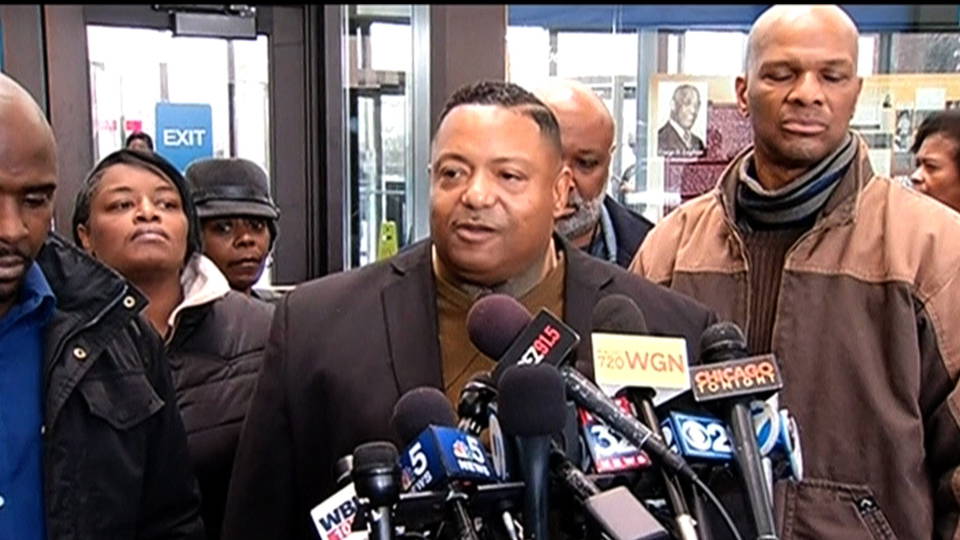
In Chicago, white police officer Jason Van Dyke pleaded not guilty to six counts of first-degree murder for the 2014 shooting of African-American teenager Laquan McDonald. Officer Van Dyke shot 17-year-old Laquan McDonald 16 times while the teenager was at a distance and walking away, posing no threat. On Tuesday, Laquan McDonald’s great-uncle Marvin Hunter called for a fully televised trial.
Marvin Hunter: "We’re not asking for a change of venue, as has been mentioned in the media before, as much as we’re asking for federal oversight. We now believe that it would be in the best interests of fairness and justice for this case if it was televised, from gavel to gavel, because we really believe that there is a culture in the County of Cook, with the police department and the criminal justice system, where police feel comfortable with murdering African-American people."
This comes as family members held a vigil to honor Quintonio LeGrier. Chicago police killed the 19-year-old college student Saturday after his father called 911 to help respond to a mental health episode in which his son was behaving oddly and carrying a baseball bat. Friends and family remembered Quintonio LeGrier as a straight-A student who ran the Chicago Marathon in 2013. The other victim of Saturday’s shooting was Bettie Jones, the mother of five grown children, who lived downstairs. Police have acknowledged they shot Bettie Jones by accident. Chicago Mayor Rahm Emanuel has cut short his vacation and returned to Chicago amid increasing calls to resign.
Missouri: Death Toll of Devastating Flooding Rises to 13
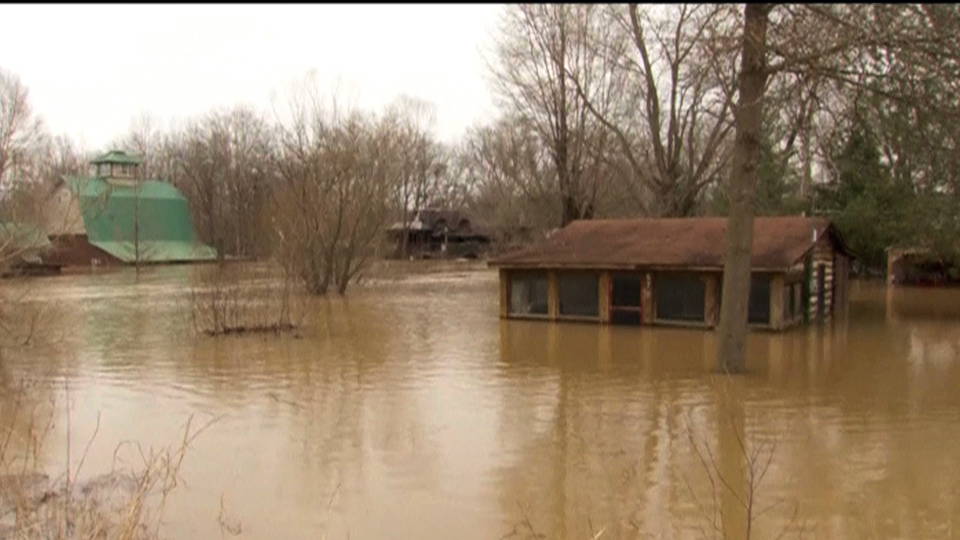
Devastating flooding continues in Missouri, forcing hundreds of families to evacuate and dozens of businesses to shut down. Parts of Interstate 44 have also been closed. It’s Missouri’s worst flooding in more than two decades. Thirteen people have died so far. The National Weather Service is warning of "record crests" of rivers in the coming days. Missouri Governor Jay Nixon has activated the National Guard. The National Weather Service says 17 million people nationwide currently live in flood warning areas.
Storm Hurtling Toward North Pole Could Raise Temps 50 Degrees
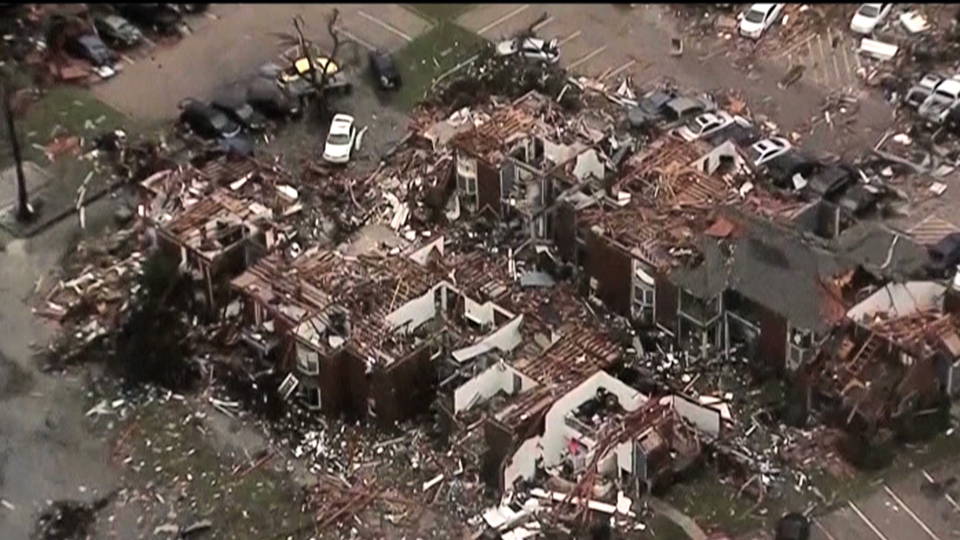
Meanwhile, scientists predict the storms that brought devastating tornadoes to Texas over the weekend will grow in size as they hurtle toward Iceland, unleashing a surge of warm air that could push temperatures at the North Pole to 50 degrees above normal. There is only one other time on record when air temperatures at the North Pole have risen above freezing. Computer model simulations predict the storm could become one of the most powerful to hit the North Atlantic. It is also expected to drop more rain on Britain, which has already experienced devastating flooding.
Colombia Issues Red Alert over Drought-Fueled Forest Fires
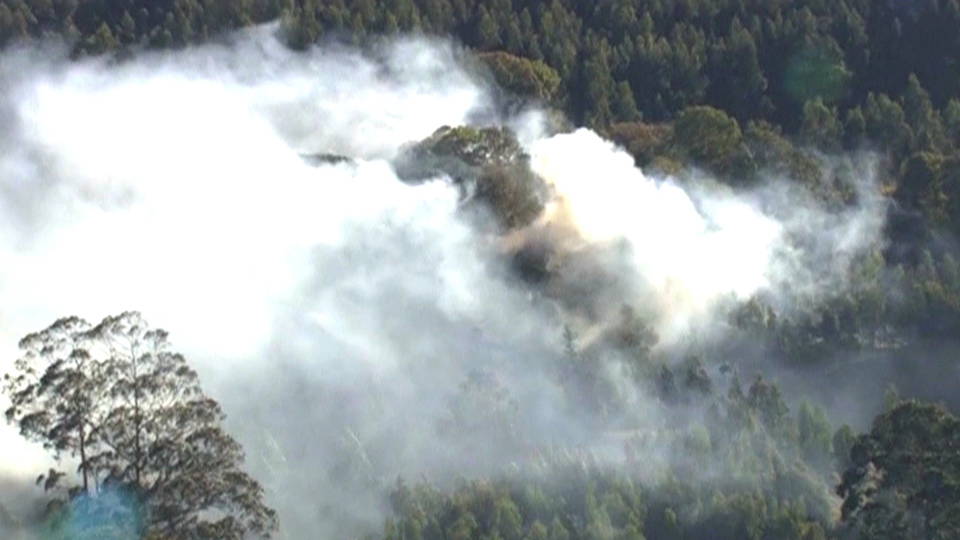
Meanwhile, in South America, Colombia has declared a red alert for the forest fires burning across the Andes mountains. The Colombian Environmental Ministry says the forest fires are a consequence of drought and rising temperatures across Colombia. The red alert applies to 80 percent of the country.
Pakistan: Suicide Bomb Kills 26
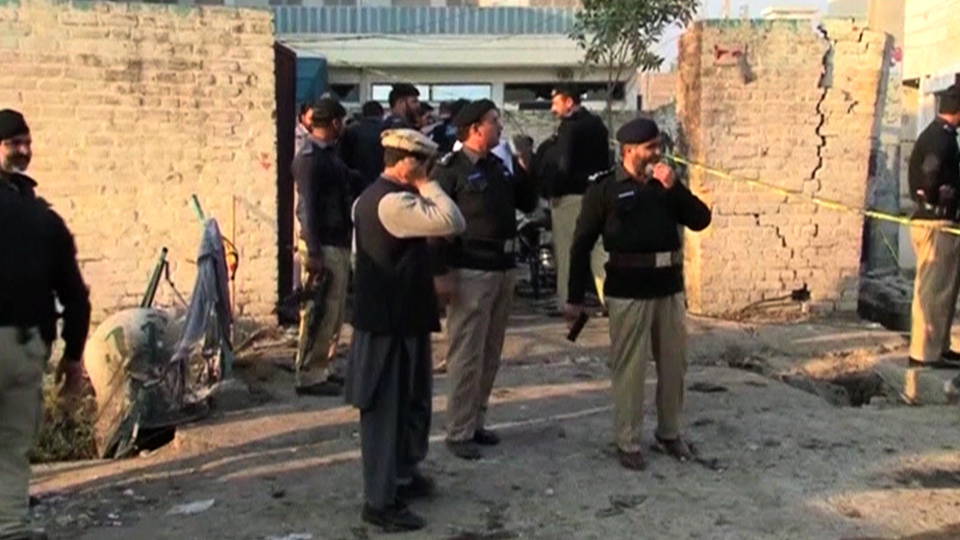
In Pakistan, a suicide bomb attack has killed at least 26 people in the northwestern city of Mardan. The bomb exploded Tuesday outside a branch of the National Database and Registration Authority, which issues government ID cards. The Taliban has claimed responsibility.
Pentagon May Seek More Troops for Afghanistan

The U.S. commander in Afghanistan, General John Campbell, has said he may seek additional U.S. troops amid what he calls a deteriorating security situation. Speaking to USA Today, Campbell called for the current number of 9,800 U.S. troops stationed in Afghanistan to be maintained for as long as possible, and said he may ask for even more troops. President Obama had pledged to withdraw the majority of the thousands of U.S. troops deployed to Afghanistan by the end of 2015. But in October, he reversed course, saying nearly 10,000 troops would remain through 2016.
Pentagon Says U.S.-Led Airstrikes Have Killed 10 ISIL Leaders
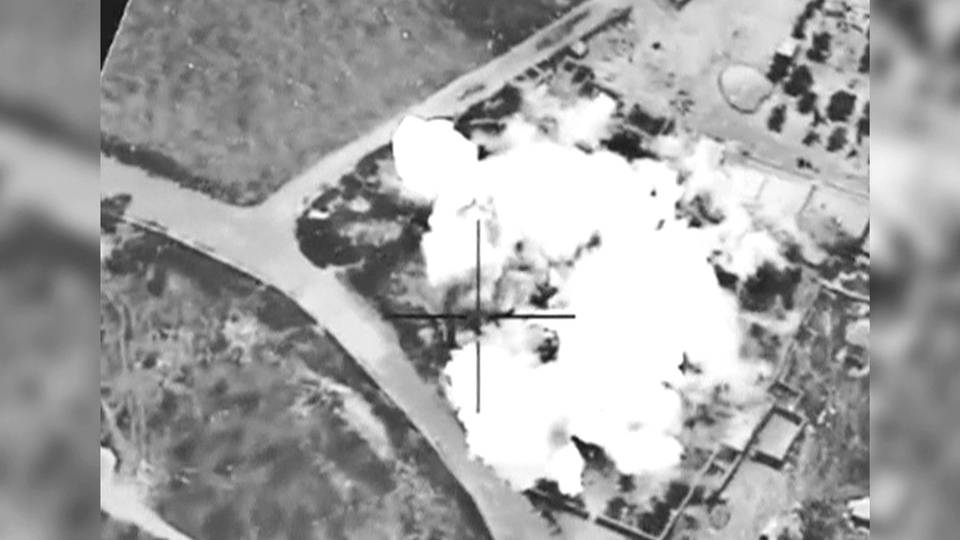
Pentagon officials say U.S.-led coalition airstrikes in Iraq and Syria have killed 10 ISILleaders over the past month. U.S. Army Colonel Steve Warren claims some were linked to the November 13 Paris attacks, which killed 130 people.
World Health Organization Declares Guinea Free of Ebola
The World Health Organization has declared Guinea free of Ebola, 42 days after the last person confirmed with the virus tested negative for the second time. Ebola has killed more than 2,500 people in Guinea and left more than 6,000 children orphaned.
New Details Show How Israel Tried to Undermine Iran Nuclear Deal
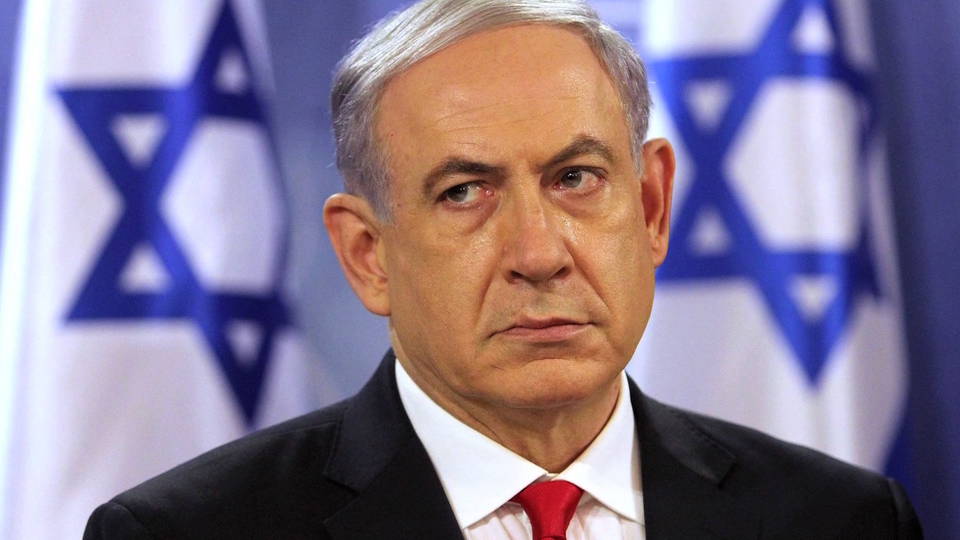
New details have emerged about how Israel sought to undermine the Iran nuclear deal—and how the United States sought to stay ahead of the Israeli efforts through intense NSA spying. The Wall Street Journal reports the NSA increased its surveillance of Israeli Prime Minister Benjamin Netanyahu in the months leading up to the talks. The NSA spying showed how Netanyahu leaked details of the U.S.-Iran negotiations, coordinated talking points with Jewish-American groups, and lobbied U.S. lawmakers to oppose the deal. The NSA monitoring of Netanyahu also swept up the contents of U.S. lawmakers’ private conversations, sparking fears in the administration that it would be accused of spying on Congress.
94 Professional & Citizen Journalists Killed in 2015
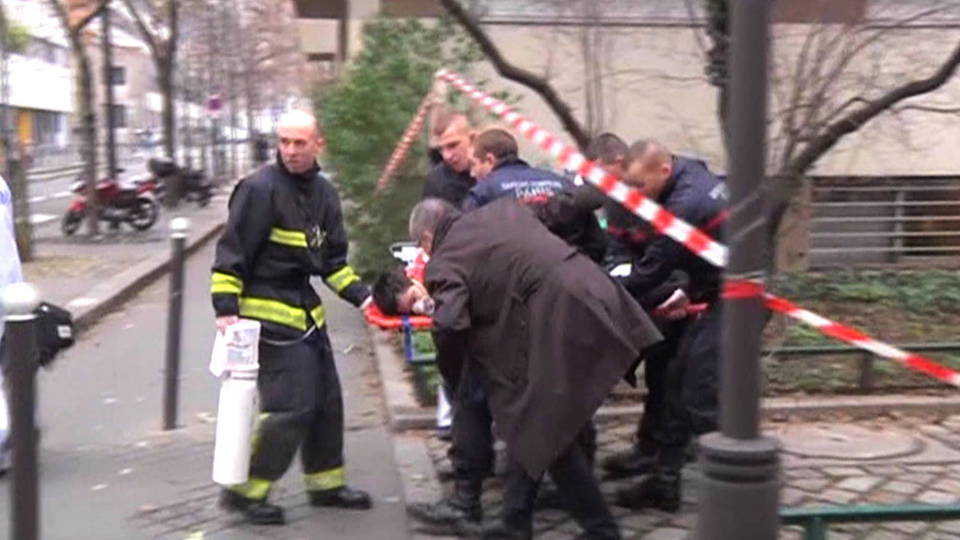
Reporters Without Borders says 67 professional journalists and 27 citizen journalists have been killed in 2015 worldwide. The deadliest countries for journalists were Iraq and Syria. The third most deadly country for journalists was France due to the January 7 attack on the newspaper Charlie Hebdo, where eight journalists were killed. Yemen, South Sudan, India, Mexico, the Philippines and Honduras all ranked among the top 10 deadliest countries for journalists. Reporters Without Borders Secretary-General Christophe Deloire spoke about how the majority of journalists killed in 2015 were deliberately targeted for their work.
Christophe Deloire: "This year, two-thirds were killed in countries at peace, countries where there is no war, where journalists are deliberately targeted—and the numbers prove it. The majority aren’t journalists in the wrong place at the wrong time during a bombing raid; they’re journalists who are murdered to stop them from doing their job."
Meanwhile, the Committee to Protect Journalists reports China and Egypt are among the worst jailers of journalists in 2015. The committee identified 199 journalists who are imprisoned because of their work worldwide. Twenty-three journalists are currently imprisoned in Egypt.
Former New York Gov. George Pataki Suspends Presidential Bid
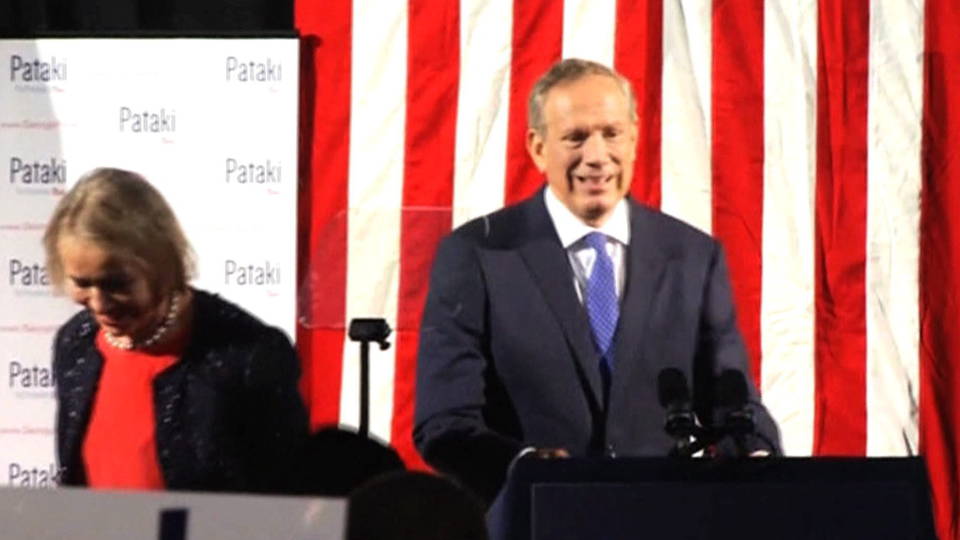
In news from the campaign trail, former New York Governor George Pataki has suspended his bid for the 2016 Republican presidential nomination. With his withdrawal, 12 Republican candidates remain in the field. Pataki was one of the first candidates to criticize front-runner Donald Trump. In announcing his withdrawal, Pataki urged the party to choose a candidate who could unite people.
Four Facing Felony Charges for Protest at Military Giant Northrop Grumman

And in Nebraska, four people are facing felony charges for a protest at the office of the military contractor Northrop Grumman, the sixth-largest military contractor in the world. Jessica Reznicek, one of the four protesters, says she smashed the windows of Northrop Grumman’s building with a sledgehammer in order to call attention to the billions of dollars of taxpayer money funneled to the military contractor. She spoke to local ABC station from jail.
Jessica Reznicek: "My intention was to be on the property and to do property destruction. I mean, that’s what I wanted to do—I didn’t want to hurt anybody, didn’t want to scare anybody—to bring public awareness to the fact that we really don’t know what our billions of taxpayers’ dollars are really going towards when we’re handing them over to Northrop Grumman. So I’ll sit in jail for as long as I need to, if it gets people talking."
In 2015, Northrop Grumman received $6.9 billion in government contracts—making it second only to rival military contractor Lockheed Martin, which received $11.7 billion in U.S. government contracts in 2015.Donate today →
Follow

When a Dream Becomes Someone Else's Nightmare: Clarence Moses-EL's 28 Years Behind Bars
WORK WITH DN!

Director of Development
On-air Graphics Operator
---------------------
207 West 25th Street, 11th Floor
New York, New York 10001, United States
---------------------
---------------------





No comments:
Post a Comment